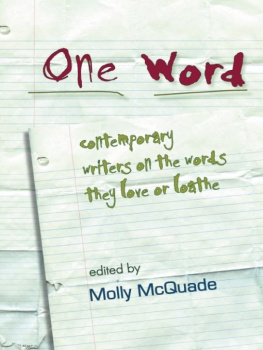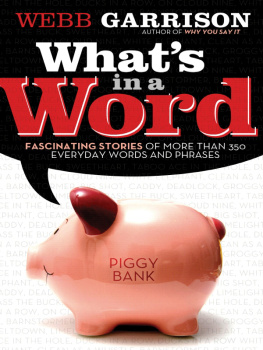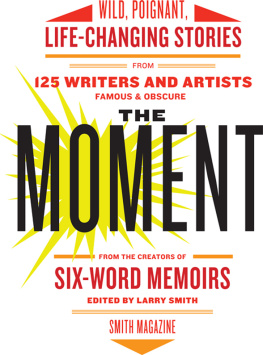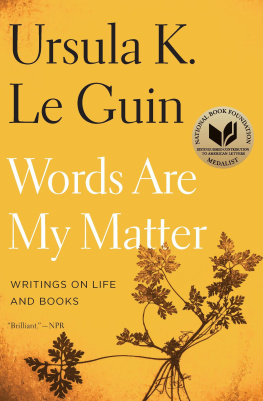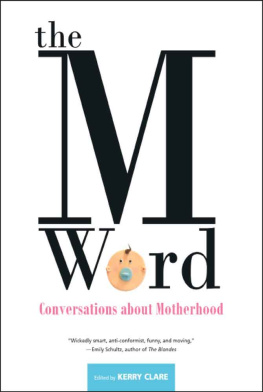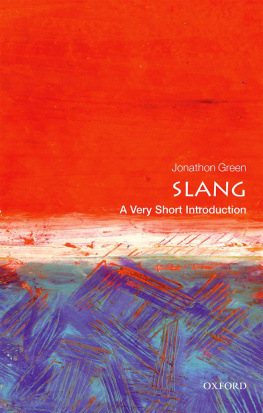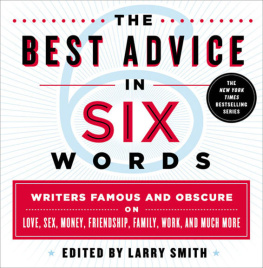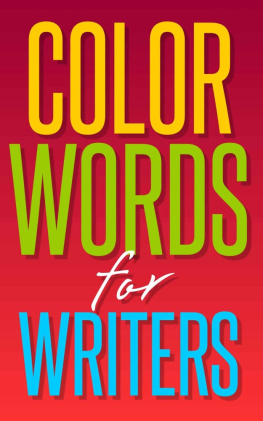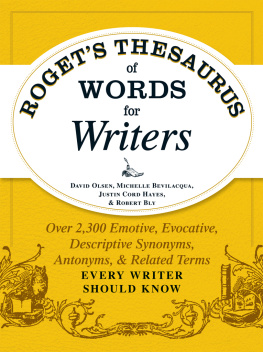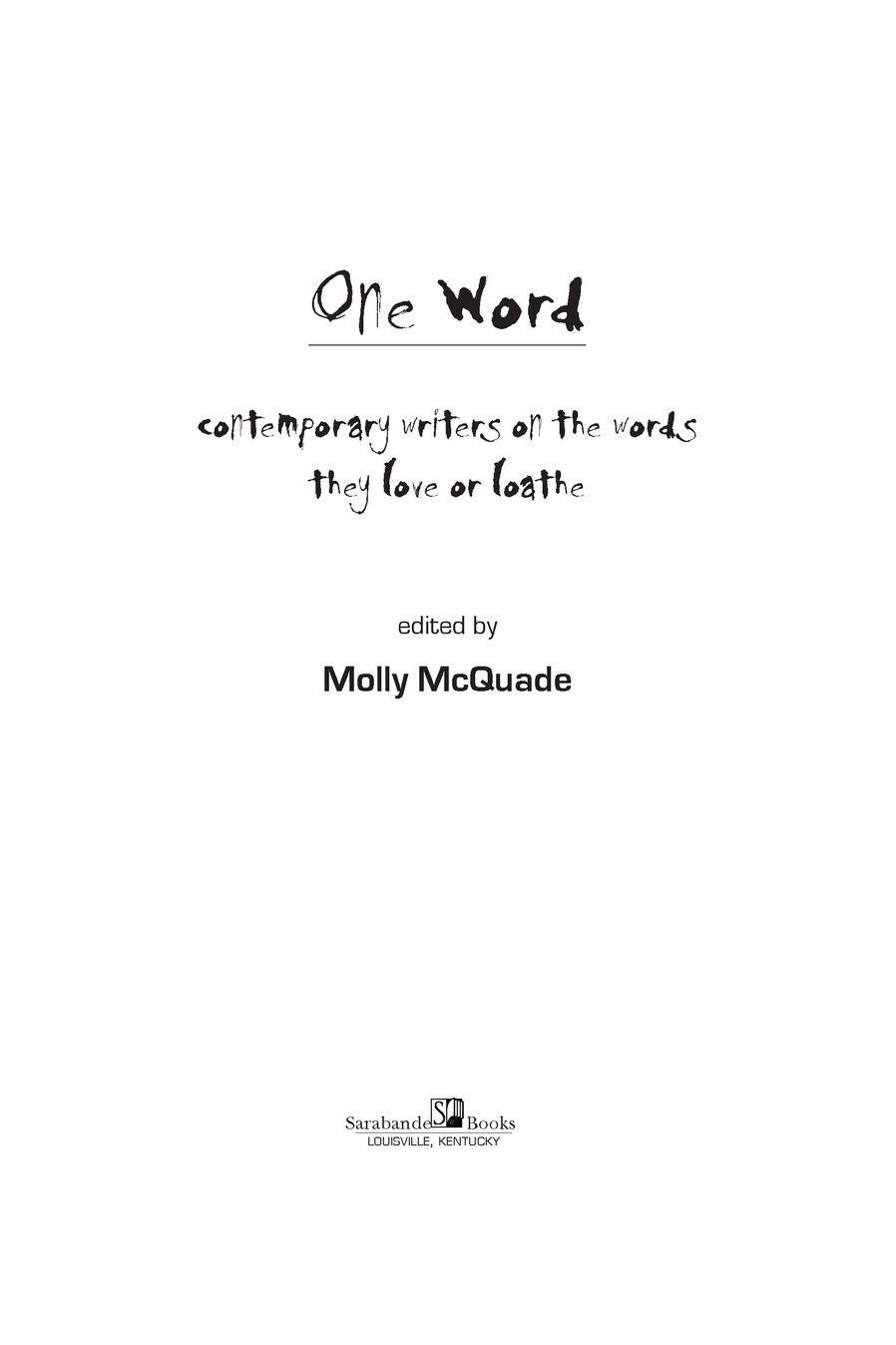Table of Contents
From this walled city come all the words in the world. They are grown in orchards and once a week a word-market is held where people come to buy the words they need and trade-in those they have not used. For people wishing to make up their own words, individual letters are also on sale. Visitors should know the taste of letters before they acquire any: A tastes very good, but Z on the other hand is dry and tastes of sawdust. X is like stale air, I is icy and refreshing, C crunchy and P full of pips. A French connoisseur has described some letters according to colour rather than taste: A black, E white, I red, U green and O blue.
Norton Juster
The chief glory of every people arises from its authors.
Samuel Johnson
FOREWORD
Molly McQuade
Before I was a person, I was a word, although I didnt know which word I was. Please dont ask me to define it now. Looking back, this is all so hard to recall.
Still, when I try to remember what word I was, another word will sometimes come to mind, nudging me a little closer to the first. Tonight, that very word is fog.
The arrival of the fog word is sensibly opportune. For I sit facing San Francisco Bay, and I am feeling logical. Even so, the exact words confronting me now are not fog, but Hyde St. Pier.
Mounted on huge pilings, and lit up without apology or aesthetic justification, the three words painted on the sign resemble the sort of composition made famous by the artist Lawrence Weiner. He hoists words, summoned in large letters, where we dont expect to see them, and by freeing certain words from their usual contexts, he allows them to live on as visual, imagined beings. In some respects that is also what this book of ours is doingboth with one word at a time and as a whole with them all.
The book wants words. The words want you to read them. They seek to change you. It is simple.
When I began inviting writers to write about a word that meant a lot to them, I wasnt sure that anyone besides myself would feel like doing it. Silly me.
As the book gathered, I found myself wishing for yet more reach and randomness from it: for words from languages other than English; slang; proper nouns; invented words or phrases; a fitting babble.
Can the words read us?
In this dictionary, anyway, can we be read by our words?
Who works for whom?
Who is the boss?
Anyhow, I wished for a babble befitting the speaker, the reader, and the writer, who could say of themselves that each had lived at least one life as a word.
A
Joel Brouwer
A selects one but implies many, and so casts a pall of anxiety over its noun. Im not sure I want a relationship, she says, and immediately I imagine her turning the pages of a gigantic catalog of relationships, debating which, if any, she might want.
A is a wager, a leap of faith, a joyous shot at how things ought to be, as Philip Larkin wrote in his poem Home Is So Sad. Sad because the shot, Larkins quick to remind us, so often falls wide. But A doesnt know that. It cant, because at the moment a joyous shot becomes the shot that fell wide, As already moved on.
As irrepressible. A never looks back.
A opens a restaurant, marries a sweetheart, places a bid, agrees to an experimental treatment. Its true that A never sticks around to see how the roll of the dice comes out, and maybe that makes A irresponsible, but at least A takes a crack at it. Say what you will, but As an optimist.
After A has seduced, eliminated, burned, and run over them, you try to explain to A that no, those were not a lover, job, house, and dog; they were your lover, job, huse, and dog. A affects contrition but really has no idea what youre talking about.
A hypothesizes and speculates, enjoys abstractions, prefers conjecture to conclusion. Nothing perplexes A more than hearing someone say, Weve got to find an answer! Find one? thinks A. There are billions of them all around you!
A offers up its noun for our consideration, evaluation, and possible adoption or acquisition. As an auctioneer.
In T. S. Eliots poem The Love Song of J. Alfred Prufrock, the intensely conflicted title character asks himself a lot of questions, among them Do I dare / Disturb the universe? and Do I dare to eat a peach?
It seems like disturbing the universe should be a far more daring and difficult challenge than eating a peach. But in fact the first question is easier to answer than the second, because it permits only two possible answers, yes or no. The problem of the peach, because it is burdened with the indefinite article, is more complicated. Before he could begin to solve it, Prufrock would first have to feel confident hed chosenfrom amongst all the peaches which have existed, presently exist, and will or might exist in the futurethe correct peach to dare to eat. From the correct branch, tree, orchard, and planet, on the correct day at the correct hour by the correct hand, and so forth.
We shouldnt be surprised if in the end Prufrock finds it easier to disturb the universe than to eat a peach. The universe has been chosen for him. The universe is a sitting duck. But hell never have the nerve to eat a peach.
Brisk and efficient, A arrives early, in advance of its master, the complacent noun, to throw open a window, light a lamp, prepare the throne where the noun will settle its bulk. A exists to serve. As meaningless without its master. But they both know who really runs the household.
And how does As noun regard its article? As a threat. A makes its noun feel dispensable and vulnerable. If a sweater itches, you can put on another. The discarded sweater is left to itch itself on the closet floor.
Fantasies cant survive without the indefinite article, and cant survive the definite. W. B. Yeats, in his poem The Lake Isle of Innisfree, begins dreaming of leaving the city for an idyllic rural retreat, where hell build a small cabin and keep a hive for the honeybee. But as soon as he starts trying to pin his whimsy down and muscle it into existence by using the definite article, determining to live alone in the bee-loud glade, where evenings full of the linnets wings, the bubble bursts, and he finds himself right back where he started, standing on the roadway, or on the pavements gray.

